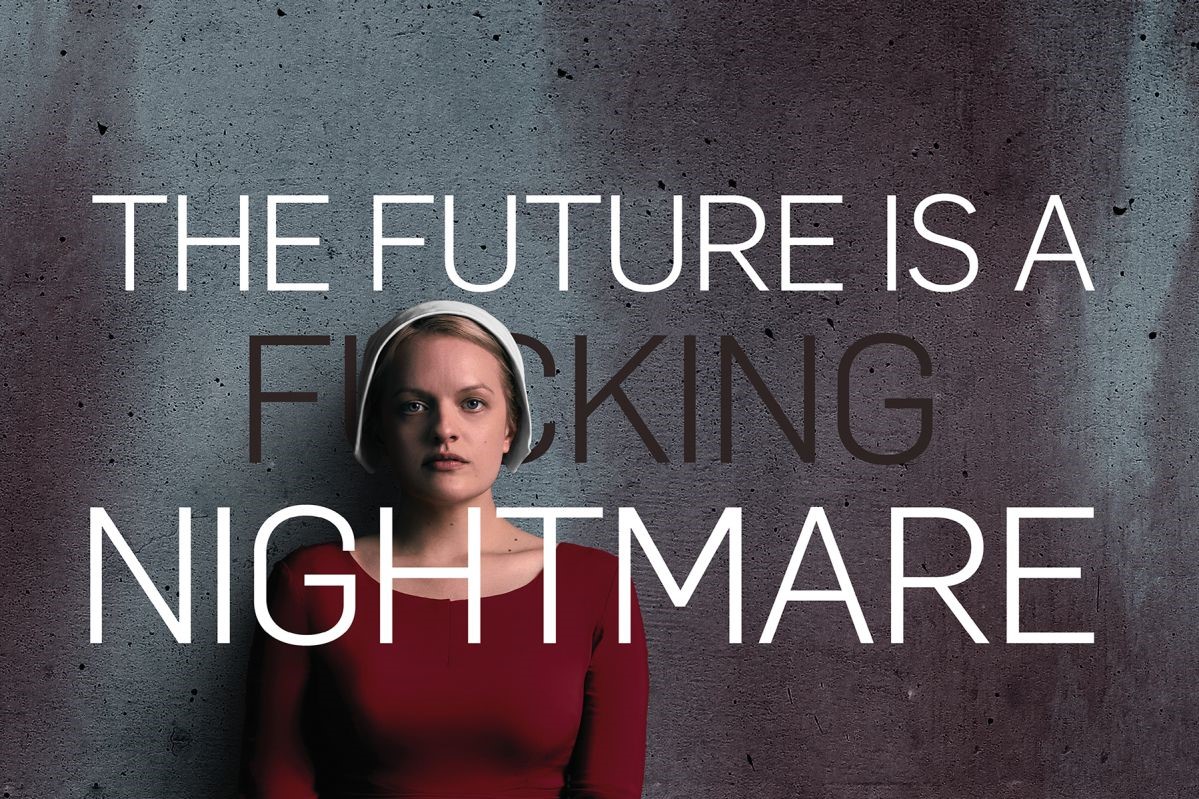How Trump, #MeToo, and Real-World Handmaid Protests Have Influenced Season Two of The Handmaid’s Tale

The Hollywood Reporter recently sat down with The Handmaid’s Tale showrunner Bruce Miller to discuss the upcoming second season. While the interview touched on a lot of topics, real-world politics inevitably came up. The first season of the show was written and developed before the 2016 election, but its commentary on patriarchy, religious misogyny, and women’s rights took on a particular relevance under an anti-choice administration headed by an alleged sexual assaulter. Women have dressed as Handmaids from the show outside the Golden Globes, at statehouses across the U.S., and outside government buildings across the world to protest for their rights and to remind everyone where the underlying logic of anti-choice legislation will inevitably lead us.
Miller said the global response to the show has been “awe-inspiring,” especially seeing “how iconic the show has become visually” as women wear Handmaid costumes to protests. “The visual connotes a whole political point of view, which is really fascinating,” he said. “Especially for Ane Crabtree, who created the costumes. It’s a costume that people have taken beyond the show and out into the real world. It’s amazing. You really feel like you’re giving people a chance to express themselves in a complicated way, which is what you’re trying to do on television: taking something complicated that you can think about in simpler ways.”
He also said, “We have had some really lovely responses, thanks to Twitter and other things, from other countries. Seeing how the show works in other cultures is fascinating, in how they view America. We’re not a country based in religious freedom; we’re founded by people who wanted everyone to be one religion. The way that America and its genesis is viewed by other countries has been fascinating, the things they’re surprised to see Gilead has maintained and the things they aren’t surprised about at all.”
Of course, Trump’s election has hung heavy over the writers’ room as they work on the second season. “You can’t avoid the influence [of the election],” Miller said. “Our writing staff is a news junkie bunch, very politically active and thinking a lot about politics, very engaged in the world. Most of [the writing staff] has children and they think about what the world will mean for them. It’s a big influence on the way you think about everything in your life, which definitely bleeds into the story-making process.”
“But America has its own issues that don’t necessarily align with the issues at play in Gilead,” he continued, “or even a pre-Gilead America. You have to be careful not to draw too many parallels. Being worried and having lots of anxiety and having a government that’s trying to split us into groups and pit one of us against each other, those are things that take place both in Gilead and in here [in our country]. But the harder part is trying not to draw too many direct parallels, and be happy with the parallels that do exist without trying to create other ones out of thin air.”
The #MeToo and TIME’S UP movements have felt similarly relevant to the show’s materials. Miller and the writing team clearly saw parallels between “the institutional and open misogyny of the world of Gilead, coupled with the open misogyny that’s being revealed to us now — the way men treat women.”
“For me, the biggest feeling you get is, ‘God, what have I been missing? These terrible things have been happening to people that I love, and I don’t even know about them.’ You feel like an idiot, more than anything else, like a baby who hasn’t been noticing these things that are going on everywhere. Inevitably, when you do a show where one of the big aspects is a very, very sharp divide between the role of men and women and the power structure, you can’t help but be pushing up against the same thoughts and ideas that are going on behind this movement. It would be asinine not to.”
Miller has also tried to addressed the sexist elephant in the room: he’s the male showrunner of a show that’s deeply built around the experiences of women. “It’s a female-driven show that’s run by a man,” he said. “We’ve certainly had those discussions internally. We’re constantly trying to create a safer and more comfortable work place, and this has opened our eyes to how unsafe and uncomfortable it can be for some people. We’ve redoubled our efforts to make sure we have an environment where people can talk about this stuff, so that if there are problems, we can solve them, so they aren’t hidden from view for years and years and people have to suffer. The only way to solve anything is for people to talk about the problems.”
Season Two of The Handmaid’s Tale begins with two episodes available on Hulu on April 25, 2018.
(via The Hollywood Reporter, image: Hulu)
Want more stories like this? Become a subscriber and support the site!
—The Mary Sue has a strict comment policy that forbids, but is not limited to, personal insults toward anyone, hate speech, and trolling.—
Have a tip we should know? tips@themarysue.com